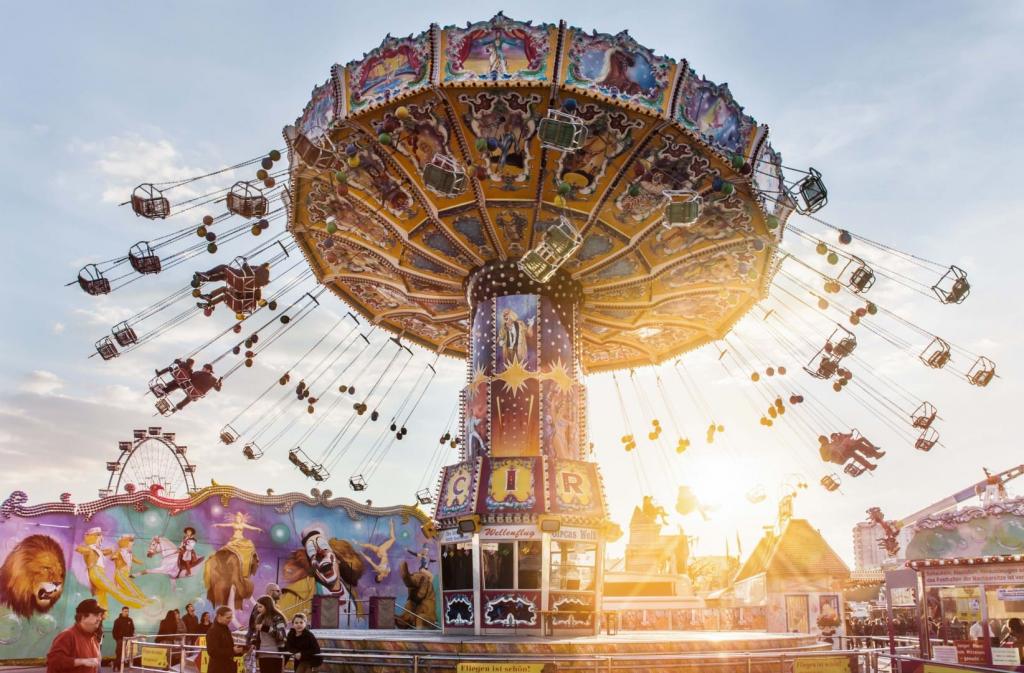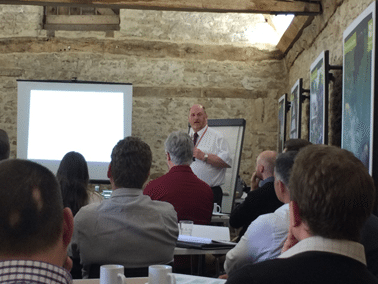On Sunday afternoon I received the following email from a friend of mine:
“Just driving on the motorway (passenger of course) and saw a fleet of fairground rides which looked fairly old. My immediate thought was ‘who checks their health and safety when they arrive at their latest destination’. Then I thought I know a man who can answer that!”
So I thought that this might be an interesting topic to discuss in this newsletter, especially with Easter just around the corner so many people will be visiting some of these touring fairgrounds.
This week’s 2 recent HSE cases look at accidents where there was a lack of H&S management.
- A sole trader who repaired cars in a residential area of Bedford has been sentenced after failing to comply with an HSE enforcement notice.
- A Rochdale recycling company has today been fined after an employee’s arm was dragged into unguarded machinery
As ever, if you have a subject that you would like us to cover one week, please contact us by phone 01458 253682, email or via our Facebook page or by Twitter.
Fairground Safety
Taking children to the fair is a great experience that has been enjoyed by families for generations. The music, the sweet taste of the candyfloss and the thrill of the rides can make for an unforgettable day. But how can you be sure your children are safe?

Modern fairground rides can be large, powerful and capable of carrying many passengers. They will let riders experience combinations of height, acceleration and multiple, quick changes of direction not normally to be had elsewhere in normal life so certain checks have to be made to ensure their safety.
Fairground rides have to be designed, manufactured and reviewed to ensure their safety before they even come into use. Once in use they MUST have an annual inspection just like an MOT.
These all have to be carried out by people who have the knowledge, experience, qualifications and competence to be able to do this work. The Amusement Devices Inspection Procedures Scheme (ADIPS) maintains a register of ride examiners who have been through a thorough vetting and induction scheme to ensure they fit these criteria.
Well maintained and operated rides are essential for ensuring the safety of riders. There are also a few simple things you can do to make sure your family have a good time at the fair and get home again without problems.
- Organised fairgrounds will normally be run by a person belonging to a member of a recognised trade association such as the Showman’s Guild of Great Britain (SGGB) or British association of Leisure Parks, Piers and Attractions (BALPPA) who will require all rides to be tested and hold a current certificate to prove this. Ride operators will generally have a copy of their certificate to hand which they can show you if asked.
- Take a look at the machines. Do they look solid, clean, tidy and well presented? A poorly turned out machine is more likely to be poorly maintained.
- Watch the attendants. Do they look as if they are doing their jobs properly and efficiently? Are they checking restraints are in place? Are they keeping an eye on what is happening while the machine is running?
- Take note of safety warnings. Fences and exclusion zones are there to keep you away from the dangers of fast moving machinery. Keep an eye on young children who may want to get closer than may be safe.
- Don’t try to ‘beat’ height restrictions. These are in place because the seats are designed to hold people of certain sizes in the machine. If riders are too big, too small, too thin etc they may be ejected from the machine and get seriously hurt.
- Impress on your children the need to sit still. Turning, kneeling, standing etc all take riders out of the seat where they are safe. Make sure they wear belts if they are fitted in the ride.
So what must the fairground ride operator do?
The law requires self-employed ride controllers to:
Manage hazards and risk – There are a number of things they must do in order to manage the hazards and risks involved in running a fairground ride. Obviously, the greater the hazard, the greater the level of risk control there should be. they should therefore consider:
- When buying a machine – The Amusement Devices Safety Council (ADSC) and HSE have drawn up a system for the safety of attractions. It covers the design, manufacture, testing and operation of fairground rides. It is strongly recommended that they adhere to this guidance when buying a new ride.
- Risk management system – They must ensure that they identify and control the risks that their machine creates. This process is called risk assessment and should form part of their health and safety management system.
- Ride inspection – They must have their ride inspected annually by a competent person. HSE considers ride inspectors registered under the Amusement Devices Inspection Procedure Scheme (ADIPS) or under the PIPA scheme (for inflatables) to be competent in undertaking these inspections.
- Ride maintenance – Their ride will degrade over time so it is important to check it over regularly and ensure that any routine or extraordinary maintenance is carried out promptly. Repairs should only be carried out by a person competent to do them and, where a safety feature is affected, the repair must be reviewed by a competent design reviewer. Routine maintenance procedures should be set out in their machine’s operations manual.
- Accident history – HSE statistics website and NAFLIC link to external website publish details of accidents / incidents involving particular types of machine. They should regularly check these and take the necessary action to ensure the same thing doesn’t happen with their machine.
- Rider safety – They must make sure that the people riding their machine can be carried safely, paying particular attention to:
- any height restrictions identified in the machine’s operation manual
- any obvious or notified disabilities that may affect the rider’s ability to ride safely and stay within any containment system. This may include excess weight, heart conditions, physical or mental impairment etc
- whether the rider appears to be under the influence of alcohol or drugs
- Emergency procedures – They must have systems in place to ensure that any foreseeable emergency can be dealt with, and that riders can be safely evacuated from the ride. This may include fire, loss of power or the structural failure of all or part of the machine. They can’t simply leave this to the emergency services as they may be busy elsewhere.
Operate the machine safely – They must do their work safely and not create risk to themselves or to others.
What checks must the operator carry out?
Fairground rides are pieces of work equipment. The Provision and Use of Work Equipment Regulations 1998 require all work equipment to be regularly inspected. Fairground rides must therefore be checked to ensure they are safe in all aspects for carrying members of the public and this should be done at least once per year.
This check is similar to a car’s MOT in so far as; without a current one in place, it is illegal for this ride to be used and, also like the MOT, it only confirms that the ride was compliant at the time of the test. Consequently, it is the operator’s duty to ensure that the ride is fully maintained throughout the year.
Fairground operators know what they should be doing to manage the risks on their machines, but if you have any doubts or worries I suggest that you do not allow your children, or yourself, onto the rides. If you really think that the ride(s) are dangerous and poorly maintained, report it to the Local Authority and/or the HSE.
With parents playing their part too there is no reason why children should not enjoy the fair without incident.
Have a great time!
If you would like any further help or support, please please contact us by phone 01458 253682, email or via our Facebook page or by Twitter.
Taunton & Somerset CPD Group at The Exchange House Taunton
Please note our new venue.
From now on we are intending to run these CPD events at the Exchange House, 12 – 14 The Crescent, Taunton TA1 4EB.
The next of the CPD events is listed below.
As previously requested, if you could let us know whether or not you can attend it would be greatly appreciated. Also, if you would like to give a talk, or know of somebody who would, please contact Jon at [email protected].
Our speaker for this one is Nick Hunt of Cupa Slate to talk about Specifying Natural Roofing Slate.
If you haven’t already booked your place, or if you are not on the CPD Seminar mailing list but would like to be please drop Jon an email and he will deal with your request.
As per our last one if you could let Jon know whether or not you can attend within 7 days of receipt of his email, it would be greatly appreciated.
Advance notice of next seminars:
April Seminar 0n 11th April will be Amwell Systems Ltd with their recently updated RIBA approved CPD Innovation in Flush Fronted Washrooms.
Contact Details [email protected] 07831 714199 or 01458 253682
Training Courses
We shall be running new courses again in 2018 and the dates and details of forthcoming courses will be published here each week.
But remember we are still available for running “In House” courses and are looking to add new training courses to our list.
If you have any questions about these courses or any other training or would like us to run a particular course for you, call Jon Wilkins of the Wilkins Safety Group on 01458 253682 or email him at [email protected]
You will note that one of these courses is the 2-day Level 2 course in Supervising Staff Safely which you and your managers should attend in order to help you manage your safety properly!
Courses available for booking now
- BSC Level 1 Award Health and Safety in a Construction Environment
- CDM Regulations 2015 – An Awareness Course
- Level 2 Award in Supervising Staff Safely
- Treating Health like Safety
- Asbestos Awareness
